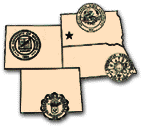Animal Science, Department of

Range Beef Cow Symposium
Date of this Version
12-11-2007
Document Type
Article
Abstract
Marker assisted selection (MAS) is a process that enables the accurate selection of specific segments of DNA that are associated with a measurable difference or effect on a complex trait, like weaning weight or marbling score. MAS can be an effective way to increase or decrease the frequency of specific DNA sequences in a population. It is important to note that many genes control complex traits, like marbling or tenderness; they are polygenic in nature. Markers for specific variations in DNA sequences are available for only a few genes that contribute to marbling or tenderness. There are many other ‘unmarked’ and unknown genes, as well as the production environment, that affect the observed phenotypes for these traits. Therefore, MAS selection will only account for a portion of the genetic variation. Measures of net genetic merit for a trait, such as Expected Progeny Differences (EPD) should be considered when making selection decisions even when marker information is available. EPD provide an estimate of the overall (net) merit of the genes an animal has for a trait including the ‘marked’ and ‘unmarked’ genes. MAS should be seen as an additional method of selection, but not a replacement of proven selection tools like EPD.
Several of the following sections provide background information on DNA and DNA markers. If you are already familiar with these concepts you may skip ahead to the section labeled ‘Benefits of Marker Assisted Selection.’


Comments
Published for the Proceedings, The Range Beef Cow Symposium XX December 11, 12 and 13, 2007 - Fort Collins, Colorado.